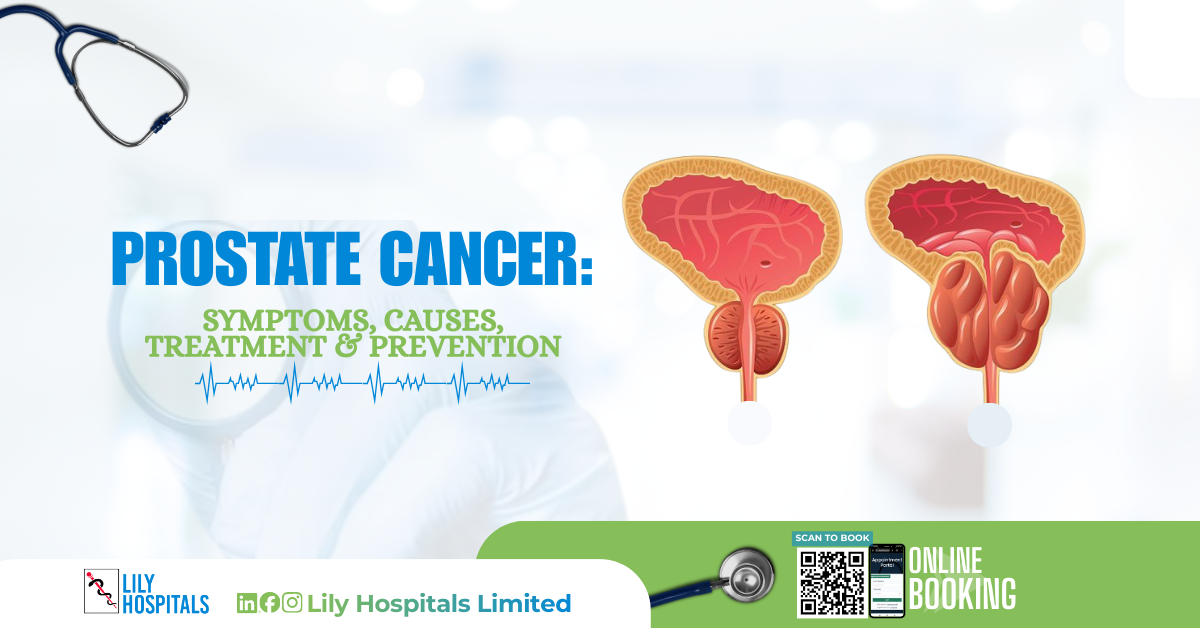
Prostate cancer remains one of the most common cancers affecting men worldwide. Although the disease varies in severity—ranging from slow-growing tumours to aggressive forms that spread rapidly—early detection and expert management dramatically improve outcomes.
As a leading healthcare provider committed to excellence, Lily Hospitals aims to equip individuals, families, and communities with trustworthy information that supports early screening, informed decision-making, and proactive care. This comprehensive guide explores the symptoms, causes, diagnosis, treatment options, and prevention strategies for prostate cancer, with practical insights on how Lily Hospitals supports patients every step of the way.
What Is Prostate Cancer?
The prostate is a small, walnut-shaped gland located below the bladder and in front of the rectum. Its primary role is to produce seminal fluid, which nourishes and transports sperm.
Prostate cancer occurs when abnormal cells in the prostate begin to multiply uncontrollably. Most prostate cancers are classified as adenocarcinomas, meaning they form in the glandular tissue. While many cases grow slowly and may not pose immediate danger, others are more aggressive.
At Lily Hospitals, our urology team emphasizes early detection, because prostate cancer is highly treatable when caught early due to its generally slow progression.
How Prostate Cancer Develops
Prostate cancer develops through a series of cellular and genetic changes:
- Mutations occur in prostate cells, altering their growth cycle.
- These mutated cells multiply and form a tumour within the prostate.
- Over time, the tumour may extend beyond the prostate capsule.
- If left untreated, cancer cells can spread to nearby lymph nodes, and eventually to the bones—especially the spine and pelvis.
To determine how aggressive a tumour is, doctors assign a Gleason score or Grade Group, based on how abnormal the prostate tissue appears under a microscope. This helps guide treatment planning.
Who Is at Risk?
Understanding your risk factors empowers you to make informed decisions about screening and lifestyle choices. Common risk factors include:
1. Age
Risk increases significantly after age 50. Most diagnoses occur in men over 65.
2. Family History
If a father, brother, or son has had prostate cancer, the risk is doubled. Mutations in genes like BRCA1 and BRCA2 may also increase risk.
3. Diet & Lifestyle
A diet high in red meat, processed food, and saturated fat may contribute to higher risk. Obesity may also increase the chance of developing advanced prostate cancer.
4. Hormonal Factors
Testosterone and other male hormones influence prostate growth. Variations in hormone levels may contribute to cancer development.
At Lily Hospitals, our specialists consider all these factors when advising patients on when and how often to undergo screening.
Symptoms of Prostate Cancer
One challenge with prostate cancer is that early stages rarely show symptoms. This is why routine screening is essential.
As the disease progresses, symptoms may include:
- Frequent urination, especially at night
- Weak or interrupted urine flow
- Difficulty starting or stopping urination
- Blood in urine or semen
- Painful ejaculation
- Erectile dysfunction
- Persistent pain in the back, hips, or pelvis
- Unexplained weight loss and fatigue
These symptoms can also indicate non-cancerous conditions such as Benign Prostatic Hyperplasia (BPH) or infections, so professional evaluation is recommended.
How Prostate Cancer Is Diagnosed
Early diagnosis offers the best chance of successful treatment. At Lily Hospitals, we use modern diagnostic tools and evidence-based protocols to ensure accuracy and comfort.
1. PSA Blood Test
The Prostate-Specific Antigen (PSA) test measures PSA levels in the bloodstream. High levels may suggest prostate cancer, but can also result from benign conditions.
2. Digital Rectal Exam (DRE)
During the exam, a doctor gently checks the prostate for lumps or abnormalities.
3. Imaging Tests
Depending on PSA and DRE findings, imaging may be recommended:
- Transrectal ultrasound
- MRI
- CT or bone scan for more advanced cases
These help determine whether cancer is localized or has spread.
4. Prostate Biopsy
If cancer is suspected, a biopsy confirms the diagnosis. Tissue samples from the prostate are examined to assess cancer grade and aggressiveness.
5. Staging
Cancer is classified into stages based on:
- Tumour size
- Spread to lymph nodes
- Spread to distant organs
This evaluation guides treatment options at Lily Hospitals.
Treatment Options Available at Lily Hospitals
Prostate cancer treatment depends on multiple factors including stage, Gleason score, age, and overall health. At Lily Hospitals, our multidisciplinary team—urologists, oncologists, radiologists, and counsellors—collaborates to create personalized treatment plans.
1. Active Surveillance
For slow-growing cancers, especially in older men, we may recommend monitoring instead of immediate treatment. This avoids unnecessary side-effects.
2. Surgery (Radical Prostatectomy)
This involves removing the entire prostate gland. Lily Hospitals offers minimally invasive surgical options where appropriate, improving recovery and reducing complications.
3. Radiation Therapy
High-energy beams are used to target and destroy cancer cells. Options include:
- External beam radiation
- Internal radiation (brachytherapy)
Radiation is often combined with hormone therapy for better outcomes in higher-risk patients.
4. Hormone Therapy (Androgen Deprivation Therapy)
This reduces or blocks testosterone, which fuels prostate cancer growth. It may be used alone or alongside other treatments.
5. Chemotherapy
Used for advanced or resistant cancers. It aims to shrink tumours and slow disease progression.
6. Targeted Therapy & Immunotherapy
For certain genetic profiles or advanced disease, modern therapies that target cancer cells more precisely may be recommended.
At Lily Hospitals, each patient’s treatment is tailored to achieve the best possible outcome while preserving quality of life.
Side-Effects and How Lily Hospitals Supports You
While modern treatments are increasingly effective, they may come with side-effects:
- Urinary incontinence
- Erectile dysfunction
- Bowel problems
- Hormonal changes (e.g., hot flashes, fatigue)
Lily Hospitals provides post-treatment rehabilitation, including:
- Pelvic floor physiotherapy
- Sexual health counselling
- Psychological support
- Lifestyle modification programs
Our patient-centered care model ensures you receive holistic, compassionate support every step of the way.
Prognosis: What to Expect
The outlook for prostate cancer is generally positive when diagnosed early:
- Localized cancer has a very high survival rate.
- Aggressive or late-stage cancers require more intensive treatment but can still be managed effectively with modern therapies.
Lily Hospitals emphasizes routine follow-ups after treatment to detect recurrence early and maintain long-term health.
Preventing Prostate Cancer: Steps You Can Take
While no method guarantees prevention, research suggests several approaches that may reduce risk:
1. Healthy Diet
Eating foods rich in fruits, vegetables, fibre, and antioxidants supports prostate health. Reduce intake of processed and high-fat foods.
2. Regular Exercise
Physical activity helps regulate hormone levels, improve immunity, and maintain healthy weight.
3. Weight Management
Obesity is linked to more aggressive prostate cancer.
4. Routine Screening
Early detection remains the most powerful tool. Lily Hospitals encourages men aged 40–45 and above, especially those at higher risk, to undergo regular screening.
5. Avoid Smoking & Excessive Alcohol
These lifestyle choices affect overall health and may increase cancer risk.
Living With or Beyond Prostate Cancer
A diagnosis can be emotional and overwhelming, but many men live long, fulfilling lives after treatment. At Lily Hospitals, we provide:
- Continuous monitoring
- Support groups
- Counselling services
- Educational materials for families
- Rehabilitation programs
Our goal is to help every patient maintain dignity, physical well-being, and emotional strength.
Partner with Lily Hospitals for Prostate Health
Prostate cancer is highly treatable when detected early. By understanding the symptoms, risk factors, and available treatment options, men can make proactive decisions for their health.
At Lily Hospitals, we are committed to:
- Providing advanced diagnostic services
- Delivering expert, compassionate treatment
- Supporting patients through every stage—from screening to survivorship
- Promoting awareness to reduce late-stage diagnosis in our communities
Your prostate health is important. Take charge today.
Book a Prostate Screening at Lily Hospitals
To schedule a consultation or PSA test, visit the nearest Lily Hospitals branch or contact our patient care line.


